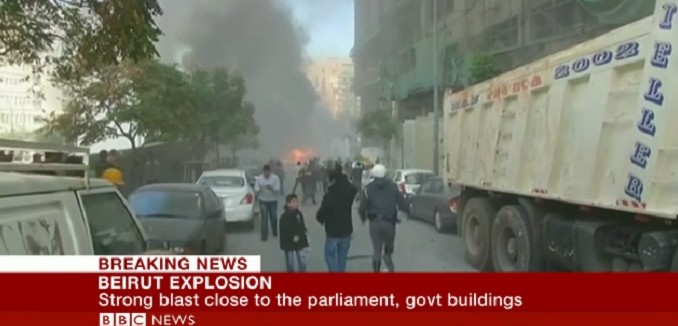A top Lebanese leader prominent for his opposition to Iranian interference in Lebanon – and more specifically to attempts by Hezbollah and Syria’s Bashar al-Assad regime to dominate the country – was murdered Friday morning by a massive car bomb that ripped through central Beirut, killing him and at least five other people.
Mohamad Chatah was a former ambassador to the United States and a close adviser to top figures in the anti-Syrian March 14 movement. His final tweet blasted Hezbollah for an ongoing political crisis that has paralyzed Lebanon:
#Hezbollah is pressing hard to be granted similar powers in security & foreign policy matters that Syria exercised in Lebanon for 15 yrs.
— Mohamad B Chatah (@mohamad_chatah) December 27, 2013
Former Lebanese Prime Minister Saad Hariri quickly identified Hezbollah as being behind the assassination:
“Those who assassinated Mohammad Shatah are the ones who assassinated Rafik Hariri; they are the ones who want to assassinate Lebanon,” Hariri said in a statement hours after a car bomb killed Shatah and five others in Downtown Beirut. “The suspects are those who are running away from international justice and refuse to appear in the Special Tribunal for Lebanon; they are the ones opening the window of evil and chaos to Lebanon and the Lebanese and are drawing regional fires,” he added. Hariri, who has been abroad for over two years for security reasons, also said the perpetrators would not stop until they drag the country into strife “as long as there are [people] in Lebanon covering up the crimes, burying their heads in the sand, and justifying the proliferation of arms and the establishment of armed groups at the expense of the state and the institutions.”
The murder will likely be read against deepening sectarian violence spilling into the region from inside Syria, where the Iran-backed Assad regime has been fighting a nearly three-year war against largely Sunni rebel groups. An upcoming conference in Geneva designed to dampen the violence has been severely criticized for potentially maneuvering Syrian Sunnis into accommodating the regime, and the international reaction to Chatah’s assassination has fueled similar criticism. European Union foreign policy chief Catherine Ashton reacted to the attack by calling on “Lebanon’s political leaders and the Lebanese people to put aside all differences and join forces… to restore security in the country.” Tony Badran, a research fellow at the Foundation for Defense of Democracies (FDD), criticized Ashton’s statement:
Ashton urges Lebanese leaders being killed by Hezbollah to join Hezbollah to restore security. http://t.co/Rwnkka0kfY
— Tony Badran (@AcrossTheBay) December 27, 2013
PT. This obscene position mirrors the premise of Geneva. Syrians should join with their killers.
— Tony Badran (@AcrossTheBay) December 27, 2013
Brookings Institute senior fellow Michael Doran was similarly acerbic, describing Ashton’s call as one that urged “Lebanese murdered by Assad and Hezbollah to let bygones be bygones.”
[Photo: BBC News / YouTube ]




